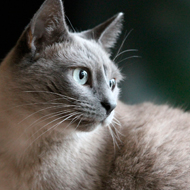
Pain should always be high on the list of a vets diagnosis
Pain is an unpleasant, emotional and sensory experience associated with actual or potential tissue damage. How it is recognised varies from country to country and culture to culture.
In her lecture at BSAVA Congress (7 April), behaviour specialist Kersti Seksel spoke about how we recognise pain especially in cats and what we can do about it.
There have been all kinds of attitudes towards pain, from 'pain is good because it stops the animal from moving too much' to 'animals feel less pain than humans'. The inability to communicate negates the possibility that an individual is feeling pain.
Pain can be classified as physiologic, pathological, acute, chronic and physiological. There is also adaptive pain - a normal response to pain - and maladaptive pain, which is the inadequate management of adaptive pain leading to physical changes in the nervous system.
When behaviour changes, our first thought should be that the animal is in pain. However, behaviour can be the result of a number of factors associated with pain.
For example, an animal may exhibit a learning behaviour as a result of a previous experience. Cats are particularly good at this - they remember past experiences and exhibit a particular behaviour if they think this experience is about to happen again. Behaviour can also change due to environment and the skill is to be able to identify when pain is physical or emotional.
Pain lowers aggression thresholds and tolerance to handling, it alters mobility and leads to learned aversions. Chronic pain also makes animals more susceptible to other diseases.
We use such parameters as vocalisation, abnormal gait, respiratory rate and heart rate to assess pain because we can recognise changes in them. But Kersti pointed out that often the clinical signs of pain are very similar to other conditions and this is why it is so important that we understand what an animal's 'normal' behaviour is like.
Understanding what is normal behaviour for a pet involves co-operation and discussions with owners. For example, with chronic pain an animal may experience sleep disturbance, be unusually aggressive, have depressed appetite, exhibit social withdrawal and other abnormal behaviours. These behaviours, however can only really be attributed as abnormal by an owner.
Add to the mix the fact that pain signs may overlap with signs of fear and diagnosis is made more difficult. The overriding message from Kersti's lecture was that we are now much more able to diagnose pain and pain should always be high on the list of a veterinary professional's diagnoses.



 The Veterinary Medicines Directorate (VMD) is inviting applications from veterinary students to attend a one-week extramural studies (EMS) placement in July 2026.
The Veterinary Medicines Directorate (VMD) is inviting applications from veterinary students to attend a one-week extramural studies (EMS) placement in July 2026.